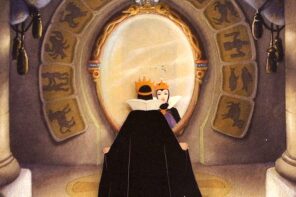The word “lost” is a common word. English usage dates back to the Middle Ages. Among the Oxford English Dictionary’s definitions: “That has perished or been destroyed; ruined, esp. morally or spiritually; (of the soul) damned.”
To be lost is not merely a geographic problem for marooned airline passengers, or for men unwilling to stop and ask for directions—it’s a spiritual and moral condition. These days a google search turns up over 500,000,000 hits (that’s half a billion); not too surprising for a basic and often-used term. Similar numerical results come from google searches on terms like “run” and “hide.” Meanwhile, “found” yields over 1.3 trillion hits; it still seems that to be found is more popular than being lost.
Even so, a vast majority of recent top hits for “lost” refer back to the ABC-TV television show. If you don’t follow Lost you’ll probably still know that May 23 is the series finale. You’ll probably also know that the show is full of religious references and implications.
What’s the hype? What’s it all about? Is it worth watching? Plenty of writers have chimed in, proclaiming it the best show ever on regular television, that standard television will never be the same, that the ending leaves much to be explained. Jumping the gun, or perhaps the shark, writers from the LA Times, USA Today, NY Times, and many other major outlets have already weighed in, well before the finale sinks in.
What then am I offering in the midst of the hullabaloo? Why write before it is over? Why write at all?
Because the ultimate response to the show’s questions have already been answered. The ending of the finale is (spoiler alert) not important. There are no answers that can be given that will leave anyone feeling satisfied. It’ll be like a Thanksgiving feeding frenzy: gobble it up and think we are satiated, but an hour later we’ll be wanting more:
“But, but, wait a minute, what about…?”
“And how did X end up…?”
“Why did X die?”
“What the f…?”
One of the ultimate, though pedestrian, questions stems from the very beginning: you’re stranded on a gorgeous island full of luscious fruits and secure shelter, with two dozen beautiful people, and you’re supposed to want to leave?
The ending will never provide an adequate explanation for how an entire island can shift in time and space, nor how beings can attain immortality, nor how philosophers can live up to, or not, their namesakes. Nor should it be so. To be lost is to be ruined, perished, of the damned. No solid answers to be found within. “Abandon hope all ye who enter here,” was the sign over the entrance to hell, imagined by Dante. Finding a lost island, especially this one, somewhere in the South Pacific, is not far from that—particularly when the island seems to contain the very light of heaven and hell, making it more of a purgatory.
Taking and Shaking
Having said all that, here are some connections between Lost and religion that are worth checking out, even if only for the sake of teaching a “religion and popular culture” course. Lost lushly abounds in religious symbolism, in mysteries and clues and revelations that trigger the spirit of the spiritual sleuth. The ambiguity compels the audience to decipher the clues and step on to the island themselves.
Lost is a postmodern pastiche of world religions, a mash-up of myths—which doesn’t make it any less significant to its receivers. Myths are always mash-ups. The audience of Lost moves from a state of disbelief and objectivity into a realm of complicity. In a recent New York Times interview, co-writer Damon Lindelhof suggests,
One of the things that we completely own is that in many ways Lost is a mash-up/remix of our favorite stories, whether that’s Bible stories from Sunday school or Narnia or Star Wars or the writings of John Steinbeck. Carlton and I both had to take philosophy classes when we were in college, and we talk about philosophy, so when certain ideas started to present themselves on the show, we just wanted to let the audience know that these philosophers are in our lexicon as storytellers.
The mash-ups of Lost mix and merge a sampling of the I Ching (seen in the Dharma Initiatives’ octagonal symbol); an Egyptian-style temple on the beach replete with hieroglyphs; Dogen’s temple somewhere inland (Dogen was a key 13th-century Japanese philosopher who founded the Soto school of Zen), and the eternal presence of Richard (Ricardo) Alpert, whose namesake was dropping acid with Timothy Leary in the 1960s and eventually reemerged from the counterculture with the name Ram Dass.
At the same time, there are the characters who surface in the show, and change and morph. Jack Shephard, for example, is clearly a redemption figure, and it remains to be seen how much redeeming he can accomplish. In early episodes he was a Jesus figure, not to mention the Psalm 23 quote: “The Lord is my shepherd, I shall not want,” and the fact that in the numerology of the show Jack is connected with the number 23.
Likewise, the “black smoke” character (eventually avatared by John Locke) leaves us wondering about the ancient story of the Golden Bough in which the priest-king is ritually murdered by his successor. The Golden Bough story was taken up by Joseph Conrad in Heart of Darkness, which was the basis for Coppola’s Apocalypse Now. Terry O’Quinn’s “John Locke” becomes Marlon Brando’s “Colonel Kurtz,” but with a really nice smile.
The hall-of-fame philosophers in the show have been well noted, and I won’t spend much time rehearsing the Enlightenment roles of John Locke, David “Desmond” Hume, and Rousseau in the course of Western world history. What is intriguing in Lost is the way that each character seems to have alternate, double personalities from those of their namesakes. In the “real,” historical realm, Locke and Hume were empiricists, they had to see it to believe it, but in the show they are the most fideistic, operating by their hunches and intuitions. Meanwhile, Shephard stands in contrast to his namesake at the beginning of the series as he is the man of science. Eventually he seems to change his stance. Hume also becomes Odysseus, who chases, especially in his sailboat, his love Penelope (“Penny”). Desmond is the heroic traveler here, not just of space, but of time as well.
Ultimately, the characters of Lost do not neatly stack up to their namesakes. Instead, the show takes and shakes: takes the various myths, and shakes them up. The “explanation” for the show is not what the show is about. Analyzing the symbols, connecting the dots, the numerology, the philosopher-characters, may or may not amount to the right answers. Finding the code might give answers, but not faith. Faith exists only when there is still doubt; it is born and thrives with questions.
What Lost is Finally About (no spoilers)
Every time I have watched Lost over the past six seasons, John Donne’s seventeenth-century refrain has echoed in my head: “No man is an island, entire of itself/ every man is a piece of the continent, a part of the main.” Simultaneously, the words of the great modern Catholic monk, Thomas Merton, in No Man is an Island, reverberate: “We learn to live by living together with others, and by living like them.”
The island is not just a lost island, but a metaphor for human individuality, and ultimately of the bankruptcy of that mythology. There is no individual, says Donne and Merton, at least not one worth knowing.
In other words, the secret of Lost was already summed up in the mantra of the second season finale: “Live together, die alone.” Such a great contrast to the existentialist view of life that tells us we are born alone and die alone. Contrast Merton: “We learn to live by living together with others.” Even one of the main writers of Lost, Damon Lindelof, says “in order to redeem yourself, you can only do it through a community.” That is the secret that is revealed, unveiled. This is the apocalypse of the story.
Such an apocalypse was foretold, decades ago, by a certain prophet named D.H. Lawrence, whose little text, Apocalypse, written late in his life, reveals a great deal. Lawrence suggests
We cannot bear connection. That is our malady. We must break away, and be isolate. We call that being free, being individual. Beyond a certain point, which we have reached, it is suicide. Perhaps we have chosen suicide. Well and good. The Apocalypse too chose suicide, with subsequent self-glorification… my individualism is really an illusion. I am a part of the great whole, and I can never escape. But I can deny my connections, break them, and become a fragment. Then I am wretched.
Whether Locke or Shephard or Austen are saviors or demons does not matter. The hero is the community, the living together.
The greatest fiction of Lost is the apocalyptic tale that we are individuals, that it is survival of the fittest. Lost then, is the antithesis of Lord of the Flies, but also of the so-called reality television shows that extol the individual “dancers,” “idols,” and “survivors.” Those are the real fictions. Lost reveals itself as reality.




